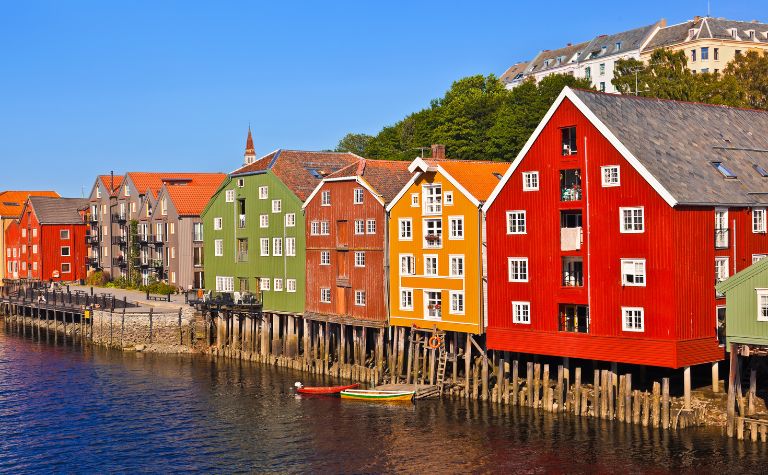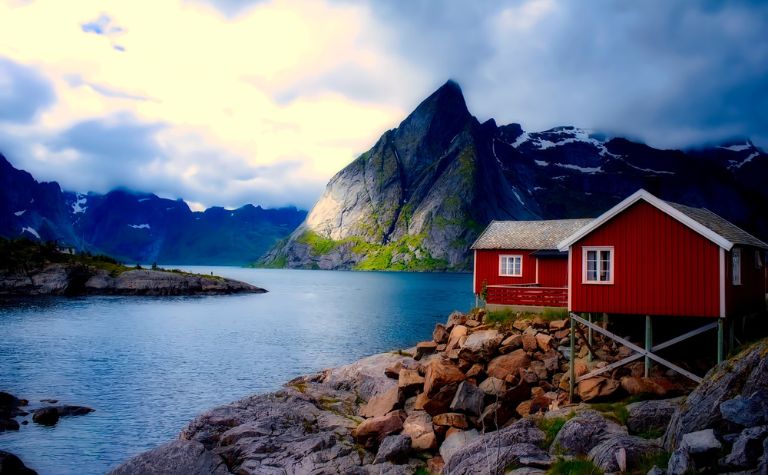There appears to be a prevailing notion that Norway is a socialist nation. While its government offers its citizens benefits such as universal healthcare and free education, saying that Norway is socialist is at best reductive and, at worst inaccurate.
Norway is not a socialist country — or, at least, it does not completely follow the archetypical model of socialism.
Instead, it uses a socio-economic model known as the “Nordic Model,” which allows free-market capitalism to exist in conjunction with a large welfare state.
Although Norway does provide its citizens with benefits that can be described as “liberal,” that does not necessarily make the country socialist.
Keep reading to know why Norway being a socialist state is a common misconception and the place of capitalism in the Norwegian economy.
Also, see Is Sweden Socialist? to learn more.

Why do people think Norway is socialist?
Norway provides its citizens with benefits such as:
- Free education for all, including university students
- Universal healthcare coverage
- Unemployment benefits
- Parental benefits
- Public pension plans
As the Norwegian government requires a substantial amount of funding for the above-mentioned benefits, it imposes direct and indirect taxes on its citizens.
The overall tax burden borne by Norwegians makes up about 39.9 percent of total domestic income. [1]
This combination of a generous social safety net and significantly high tax is traditionally associated with socialism.
In comparison, the People’s Republic of China offers its citizens benefits similar to those for Norwegians, such as:
- The minimum living standard guarantee program, called dibao
- Health insurance for the state employees
- Job guarantee to university students
According to a report, by 2025, China’s welfare spending can be more than one-third of its gross domestic product. [2]
However, it is worth noting that the Chinese government imposes an Individual Income Tax on citizens that can reach up to 45% of their annual taxable income. [3]
People think Norway is socialist due to the cradle-to-grave social welfare systems it provides to citizens and the comparatively higher rate of tax they pay for it.
Traditionally, these two features have been a hallmark of a socialist economy.
However, as mentioned earlier, Norway is not a socialist nation, at least not in the strictest sense of the word.
The theory of socialism was created in response to capitalism, which socialists argue facilitates the exploitation of workers and the destruction of democracy, among others. [4]
Therefore, it can be argued that in a socialist economy, capitalism is minimal, if not nonexistent altogether.
Also, see Why Does Sweden Have a Small Population? to learn more.

Does Norway value capitalism?
According to a report from the People’s Policy Project, the Norwegian state owns close to 60 percent of the nation’s wealth. [5]
It has direct ownership of 70 companies and has a 67% share in Equinor, the largest energy company in the nation. [6] The government likewise employs more than 30% of the workforce.
Norway values capitalism, as is evident by the government’s backing of a free-market economy and little to no regulation of businesses.
It creates a conducive environment that allows private, for-profit companies to run freely and do business globally.
In fact, Norway is constantly ranked as one of the best countries in terms of ease of doing business in the annual report published by the World Bank.
Between 2006-2020, Norway was regularly featured in the top ten nations on the list, except in 2008, when it dropped to the 11th position.
Even the companies wholly or partially owned by the state are run as private entities. The government usually does not interfere in day-to-day operations.
Each of these entities has a board of directors that oversees its overall management.
In a capitalist economy, the government allows the free movement of labor, capital, and goods.
According to the Heritage Foundation’s 2022 Index of Economic Freedom, Norway ranks 14 in the list of most capitalist countries worldwide. [7]
By comparison, Canada, the United Kingdom, and the United States rank 15th, 24th, and 25th, respectively.
Also, see What Is Sweden Known For? to learn more.

Is Norway a rich or poor country?
Norway is one of the richest countries on the earth. According to an International Monetary Fund report, Norway’s GDP per capita is the third highest in the world.
Below is a table of the GDP per capita figures of some of the world’s richest countries:
| Country | GDP per capita (in USD) | Ranking |
| Luxembourg | 135045.821 | 1 |
| Ireland | 101509.49 | 2 |
| Norway | 99480.855 | 3 |
| Switzerland | 96390.049 | 4 |
| United States | 76027.043 | 8 |
| Iceland | 74417.385 | 9 |
| Denmark | 68093.996 | 10 |
| Sweden | 57977.697 | 12 |
| Canada | 57405.931 | 14 |
| Finland | 53744.875 | 16 |
| United Kingdom | 49761.126 | 24 |
Interestingly, Norway did not become a rich country until the 1960s, when oil was discovered on the Norwegian continental shelf.
Since then, the black gold industry has created more than 12,000 billion Norwegian Krone (over 1,200 billion USD) in value. [9] To date, oil and gas production makes up 20% of Norway’s economy.
In 1990, the Norwegian government set up the Government Pension Fund Global, which consists of surplus petroleum revenue and is the largest sovereign wealth fund in the world.
A sovereign wealth fund functions, among others, to encourage the economic and social development of a country. [10]
At present, the Government Pension Fund Global has investments in 9338 companies in 70 countries.
Since 1998, the fund has generated an annual return of 6.62%, which is about 8,007 billion kroner (close to 800 billion USD). [11]
The fund currently stands at over 11 trillion kroner (more than 1.1 trillion USD) and, on average, constitutes over 211,000 USD for every resident.
As of 2021, Norway remains in the top ten happiest countries in the world. [12]
Although there can be no definitive conclusion drawn as to whether the country’s economic structure has a direct relationship with its citizens’ happiness levels, that is certainly a common argument espoused by major publications such as Time [13].
A similar trend can be observed in other Nordic countries that are mistakenly presumed to be socialist. [14]
Conclusion
Norway follows the Nordic Model of an economy that combines free-market capitalism and a large welfare state. However, it is not a socialist state.
Also, see How to Move to Sweden to learn more.
